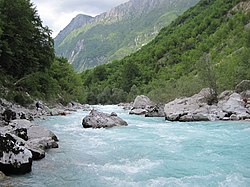SOCA
| Soča/Isonzo | |
|---|---|

The Soča near Bovec
|
|
| Country | Slovenia, Italy |
| Basin | |
| Main source |
Julian Alps, west of Triglav 876 m (2,874 ft) |
| River mouth | Adriatic Sea, near Monfalcone |
| Basin size | 3,400 km2 (1,300 sq mi) |
| Physical characteristics | |
| Length | 138 km (86 mi) |
| Discharge |
|
The Soča (pronounced [ˈsoːtʃa] in Slovene) or Isonzo (pronounced [iˈzontso] in Italian) (other names Friulian: Lusinç, German: Sontig, Latin: Aesontius or Isontius) is a 138-kilometre (86 mi) long river that flows through western Slovenia (96 kilometres or 60 miles) and northeastern Italy (43 kilometres or 27 miles).
An Alpine river in character, its source lies in the Trenta Valley in the Julian Alps in northwestern Slovenia, at an elevation of 876 metres (2,874 ft). The river runs past the towns of Bovec, Kobarid, Tolmin, Kanal ob Soči, Nova Gorica (where it is crossed by the Solkan Bridge), and Gorizia, entering the Adriatic Sea close to the town of Monfalcone. It has a nival-pluvial regime in its upper course and pluvial-nival in its lower course.
Prior to the First World War, the river formed part of the border between Kingdom of Italy and the Austro-Hungarian Empire. During World War I, it was the scene of bitter fighting between the two countries, culminating in the Battle of Caporetto in 1917.
...
Wikipedia
